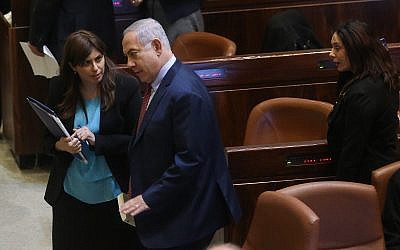Minister says he won’t enforce law to shut mini-markets on Shabbat
Aryeh Deri now claims change in legislation he supported, threatened to resign over, wasn't his idea or even necessary, and can't be put into practice
By Stuart Winer and TOI staff 11 January 2018, 12:57 pm

Leader of the Shas party Interior Minister Aryeh Deri leads a party faction meeting at the Knesset, January 01, 2018. (Miriam Alster/Flash90)
Interior Minister Aryeh Deri said he would not enforce a controversial new law to prevent mini-markets from opening on Shabbat, days after he managed to shove the legislation through the Knesset by threatening to quit if it wasn’t passed.
Seeking to calm fears of religious coercion, Deri, the head of the ultra-Orthodox Shas party, said he was uninterested in the power vested in him by the law that allowed him to shutter stores on the Jewish day of rest, in an interview published by the Yedioth Ahronoth daily Thursday.
The bill passed the Knesset 58-57 Tuesday morning, despite an opposition attempt to filibuster the legislation and fierce criticism of the measure from some corners of the ruling coalition.
Deri, who had threatened to resign if the legislation wasn’t brought to the Knesset, claimed media hype has given disproportionate import to the law.
“The interior minister doesn’t have power of enforcement,” Deri noted. “I can’t close shops on Shabbat. I can’t and don’t intend to enforce the law.”
The so-called “mini-markets law” grants the interior minister the power to oversee and reject local ordinances relating to whether businesses may remain open on Shabbat, the Jewish day of rest that runs from Friday evening until Saturday night.
“We didn’t initiate any religious legislation,” insisted Deri, whose party championed the law. “I really don’t need this law, because I know that with religious coercion and legislation you don’t get results. Neither I nor the ultra-Orthodox parties proposed the mini-markets law.”
The change in law was sponsored by the government rather than brought as a private member’s bill by a particular lawmaker. It states that any municipal bylaw granting mini-markets the right to operate on Shabbat must also be approved by the interior minister. Approval will only be given if the minister deems the businesses are required in order to meet essential needs. In the past, the default was that the interior minister had 60 days to veto any such bylaws.
Businesses that sell food and drink to be consumed on the premises such as cafes and restaurants, as well as cinemas and theaters, are not included in the restrictions.
“Every citizen or resident should deal with this law in his own city,” Deri said. “If none of the residents of Givatayim are bothered by the matter of mini-markets then that is okay. I don’t intend to get involved.”
The Tel Aviv suburb Givatayim passed a bylaw permitting mini-markets to open on Shabbat on December 31, to preempt the Knesset law. It thus joined the city of Rishon Lezion, which approved similar legislation the week before, and the city of Tel Aviv, which has had such a bylaw in place since 2014.
Prime Minister Benjamin Netanyahu attends a Knesset vote on the so-called mini-markets bill, January 8, 2018. (Yonatan Sindel/Flash90)
Critics of the law see it as an attempt to force religious observance on the public. The coalition agreed to back the proposal as part of an effort to shore up ultra-Orthodox support in the wake of a dispute over train maintenance on Shabbat that saw MK Yaakov Litzman of the ultra-Orthodox United Torah Judaism party resign as health minister in protest late last year.
Speaking to Army Radio Thursday, Litzman contradicted Deri and vowed that shops would be kept closed on Shabbat.
“If he thinks it is so hard [to enforce] then why did he push for it by all means? I disagree with him. It will be done; it preserves the status quo that was shattered,” he said.
In a separate vote immediately after the approval of the mini-markets bill, lawmakers passed a measure allowing Litzman to retain control of the Health Ministry while remaining a deputy minister.
MK Yaakov Litzman seen during a vote on a bill allowing him to run as Health Ministry as a deputy minister under Prime Minister Benjamin Netanyahu, at the assembly hall of the Knesset, on January 10, 2018. (Yonatan Sindel/Flash90)
The vote on the mini-markets bill was originally slated for last week, but was pushed off when Likud MK Yehudah Glick’s absence from the Knesset due to the death of his wife left the coalition without a surefire majority.
Highlighting coalition efforts to get the bill passed, Deri at the time unsuccessfully sought to bring Glick to the Knesset hours after the funeral of Glick’s wife. He also tried to have one of his own ministers resign from the Knesset — Religious Affairs Minister David Azoulay, who was hospitalized for most of last week and therefore unable to vote — so that another Shas member could take his place.
Both Glick and Azoulay were present in the Knesset on Tuesday, when the legislation passed.
The law passed its first reading last month after Deri threatened to quit the government, issuing an ultimatum hours before the vote conditioning his continued tenure as minister on its passage. But it had since languished on the coalition whip’s desk as Deri sought to secure the majority needed to pass it.
In a last-ditch attempt to secure a majority, coalition leaders reached an agreement Sunday to soften the bill, agreeing to exempt convenience stores attached to gas stations from the legislation. Some coalition lawmakers had hoped to also include an exemption for the southern city of Eilat, but the proposal was rejected by the ultra-Orthodox Shas and United Torah Judaism parties.
“The Eilat municipality prohibits trade on Shabbat, and nonetheless everything is open and going on there,” Deri said. “Is anyone enforcing it? No one. It is all open. Regarding Eilat, nothing has changed. The Eilat mayor doesn’t understand this law because of media incitement. Every morning he opens the paper and reads ‘Aryeh Deri is going to close all your mini-markets.'”
The final vote came after a 15-hour filibuster by the opposition. Four of Yisrael Beytenu’s five MKs voted against the measure, with Immigration Minister Sofa Landver, not wishing to risk losing her ministerial post by voting against the government, sitting out of the ballot. Likud MK Sharren Haskel and Kulanu’s Tali Ploskov also skipped the vote, having expressed misgivings about the move, while independent lawmaker Orly Levy-Abekasis joined the opposition with a no vote.
The full interview with Deri was to be published Friday in Yedioth Ahronoth’s weekend edition.


No comments:
Post a Comment